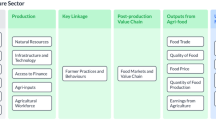Abstract
Overcoming the widespread malnutrition prevailing in the country has become a priority task. Based on the experience of the green revolution, it is clear that a farmer-led approach is essential for achieving the goal of freedom from malnutrition. Also there is need for concurrent action in the following five areas—overcoming undernutrition, protein hunger as well as hidden hunger caused by micronutrient malnutrition, attention to clean drinking water and sanitation, and finally ensuring safe handling of food at the post-harvest level to avoid mycotoxins. If we are to achieve our goal of ending malnutrition in the country, it is essential that agriculture, nutrition and health are attended to in an interactive way.
Similar content being viewed by others
Notes
Panchayat: An elected village council in India.
References
Carson R (1962) Silent spring. Penguin Books, London
Chambers R, Pacey A, Thrupp LA (eds) (1989) Farmer first: farmer innovation and agricultural research. ITDG Publishing, London
Das PK, Bhavani RV, Swaminathan MS (2014) A farming system model to leverage agriculture for nutritional outcomes. Agric Res 3(3):193–203
IFPRI (2016) Global nutrition report 2016: from promise to impact. Ending Malnutrition by 2030. International Food Policy Research Institute. Washington, DC
Kranthi KR (2015) Agrarian crisis: why farmers commit suicide? Cotton Statistics and News 44:1–5
Narain S, Bhushan C, Misra SS (2012) Food as toxin. Centre for Science and Environment, New Delhi
Narayanan R, Sahoo S, Behera R (2015) Development of a tool for the assessment of complementary feeding practices of children (9–12 months). MSSRF, Chennai
National Research Council (1989) Lost crops of the incas: little known plants of the Andes with promise for worldwide cultivation. National Academy Press, Washington
Rao N (2015) M.S Swaminathan in conversation with Nitya Rao: from reflections on my life to the ethics and politics of science. Academic Foundation, New Delhi
Ruxin J (2000) The United Nations Protein Advisory Group. In: Smith DF, Phillips J (eds) Food science, policy and regulation in the twentieth century: international and comparative perspectives. Routledge, London, pp 151–166
Sahgal MZ (1994) An Indian freedom fighter recalls her life. East Gate Books, New York
Sen AK (1981) Poverty and famines: an essay on entitlement and deprivation. Oxford University Press, Oxford
Shah G, Mander H, Thorat S, Deshpande S, Baviskar A (2006) Untouchability in rural India. Sage, New Delhi
Sinha K (2012) Malnourishment a national shame: Manmohan Singh. Times of India. January 11, 2012. http://timesofindia.indiatimes.com/india/Malnourishment-a-national-shame-Manmohan-Singh/articleshow/11443478.cms. Accessed 13 July 2016
Survey of India (2015) Economic Survey 2014–15. National Portal of India. http://indiabudget.nic.in/es2015-16/echapter-vol1.pdf
Swaminathan MS (1972) Can we face a widespread drought again without food imports? Dr Rajendra Prasad Memorial Lecture. March 26. Indian Society of Agricultural Statistics. New Delhi
Swaminathan MS (1972) Study group on the development of pre-school child. Ministry of Education and Social Welfare, New Delhi
Swaminathan MS (2013) Genesis and growth of the yield revolution in wheat in India: lessons for shaping our agricultural destiny. Agric Res 2:183–188
Swaminathan MS (2015) Combating hunger and achieving food security. Cambridge University Press, Cambridge
Author information
Authors and Affiliations
Corresponding author
Rights and permissions
About this article
Cite this article
Rao, N., Swaminathan, M.S. A Farmer-Led Approach to Achieving a Malnutrition-Free India. Agric Res 6, 1–7 (2017). https://doi.org/10.1007/s40003-016-0240-8
Received:
Accepted:
Published:
Issue Date:
DOI: https://doi.org/10.1007/s40003-016-0240-8




